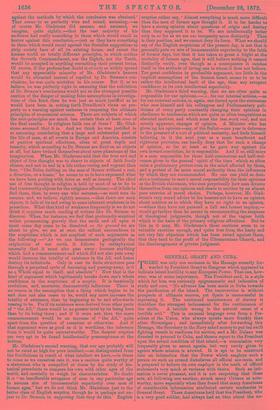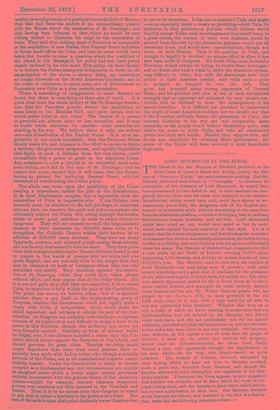GENERAL GRANT AND CUBA.
THERE was only one sentence in the Message recently for- warded by President Grant to Congress which appeared to indicate latent hostility to any European Power. That one, how- ever, was of some importance. The President said, in a style which for him was curiously epigrammatic and indicative of study and care, "No advance has been made in Cuba towards the pacification of the island. The insurrection is without prospects of ultimate success, yet Spain is unsuccessful in
repressing it. The continued maintenance of slavery is doubtless the strongest inducement for the continuance of
the strife. A terrible wrong is the natural cause of a terrible evil." This is unusual language even from a Pre- sident of the Union, who always speaks more frankly than other Sovereigns ; and immediately after forwarding this Message, the Secretary to the Navy asked money to put ten swift fighting vessels in readiness for service, and a Mr. Delano was directed to proceed to Cuba, and thence report to the President upon the actual condition of that island,—a commission very frequently given to secret agents, but very rarely given to agents whose mission is avowed. It is apt to be construed into an intimation that the Power which employs such a person on such an errand disbelieves all official accounts, and is prepared to believe its own employe's in the teeth of official statements very much at variance with theirs. Such an inti- mation is never pleasant, and it is not surprising that these acts, all following one another, struck many Cubans as note- worthy, more especially when they found that many Americans of considerable information attributed certain tendencies to General Grant. These Americans held that the President, who is a very good soldier, had always had an idea about the ne-
cessity,on naval grounds, of a good position in the Gulf of Mexico; that this had been the motive of his extraordinary quarrel with the Senate about the annexation of St. Domingo ; and that having been defeated in that object, he would be very willing indeed to illustrate his reign by the acquisition of Cuba. They said that nothing made a President so memorable as the acquisition of new States, that General Grant had twice or thrice made offers for Cuba, and that he never would have taken the trouble to raise a question about the condition of the island in his Message if his policy had not been pretty clearly outlined in his own mind. This policy, on their theory, is to declare the Cuban insurgents belligerents, to insist on the emancipation of the slaves — slavery being an institution no longer allowable on the North American Continent, and in the event of resistance, to assert some sort of Protectorate or Suzerainty over Cuba as a step towards annexation.
There is something of exaggeration in these theories no doubt, but there is something in them also of truth. It is quite clear from the whole history of the St. Domingo transac- tion, that the President greatly desires the acquisition of some island in the Mexican Gulf, and quite certain that he would prefer Cuba to any other. The desires of a person so powerful are always more or less executive, and it may be worth while therefore to consider what obstacles are standing in his way. We believe there is only one serious one—the Constitution of the United States. It is most im- probable, to our minds impossible, that the European States should waste life and treasure in the effort to secure to Spain a territory she grievously misgoverns, and equally improbable that Spain, at such a distance from her own shores, could successfully defy a power so great as the American Union. Any resistance to such a project to be successful must come from within, as it did in the case of St. Domingo ; and we cannot feel quite assured that it will come, that the Senate, having no ground for traducing General Grant, will feel interested in overthrowing his Cuban policy.
The whole case turns upon the possibility of the Union keeping a dependency outside the pale of the Constitution. If, as most _Englishmen imagine, this is impossible, then the annexation of Cuba is impossible also. If the Cubans, once annexed, must be admitted to the full privileges of American citizens, then, we conceive, the quiet and judicious persons who ultimately control the Union will, acting through the Senate, refuse to make great sacrifices in order to admit citizens so dangerous. They will not consent to swell the large coloured element in their electorate by 900,000 more votes, or to strengthen the Catholic Church within their borders by an addition of 600,000 more devotees. They have too many Spaniards, soutanes, and coloured people among them already, and are fiercely determined to have no more. They have given votes both to negroes and to native Texans, but they intend power to remain in the hands of persons who are white and who speak English, and are jealously alive to the danger that they may be swamped by hosts of foreigners whom they can only assimilate very slowly. They therefore opposed the annexa- tion of St. Domingo, which they could have taken almost without effort, and may oppose that of the richer island. But it is not yet quite clear that they are compelled, if they annex Cuba, to introduce it fully within the pale of the Constitution. The point has never, we believe, arisen ; but it is doubtful whether there is any limit to the treaty-making power of Congress, whether the Government could not legally make a treaty with Cuba, if independent, which would make the island dependent, and yet keep it outside the pale of the Con- stitution. As Congress can certainly cede territory—a supreme exercise of its right—it is very difficult to assign a limit to its power in this direction, though the authority has never yet been formally exerted. Certainly no form of alliance would be illegal, even if the alliance included a clause that the Pre- sident should always appoint the Governor of the Island, and should garrison its great cities. Treaties involving much larger departures than these from usual practice have re- peatedly been made with Indian tribes, who, though nominally subjects of the Union, are in all constitutional respects excep- tionally treated. Under the Constitution a treaty is always accepted as a fundamental law, and circumstances can readily be imagined under which a treaty might contain provisions entirely inconsistent with the general theory of the American system—might, for example, concede immense temporary powers over countries not fully annexed to the President and Senate. Then it is by no means clear that Congress is bound in any way to admit a territory to the position of a State. The text of the article upon that point distinctlyleaves Congress free
to act on its discretion. It has not so admitted Utah, and might —more especially under a treaty so providing—hold Cuba for centuries in that position—a position which Cubans would heartily accept. Under such an arrangement they would have, to a great extent, the control of their own destinies, would be secured from disorder by the American garrison, world vay all American taxes, and would have representatives, though not votes, in both Houses. That is the position of Utah, and though its legality is doubted, no serious effort to titter it has ever been made in Congress. No, doubt Cuba, once declared a Territory, would always be trying to secure State privileges ; and no doubt also such a claim is, under the American system, very difficult to resist ; but still the Americans, with their notion of their manifest destiny, may with such a prize in prospect be tempted to run the risk. That prize has tempted many strong opponents of General Grant, and his position just now is one of each exceptional strength that no opponent not animated by very sincere con- viction will be inclined to incur the consequences of his serious hostility. It is difficult for outsiders to understand the depth of some American feelings, but we should say that if the President seriously desires the possession of Cuba, the internal obstacles in his way are not insuperable, more especially as the people would believe themselves quite able within ten years to settle Cuba, and take all substantive power into their own hands. Should they support him, and devise any expedient for avoiding State government, the power of the Union will have received a most formidable expansion.



































 Previous page
Previous page